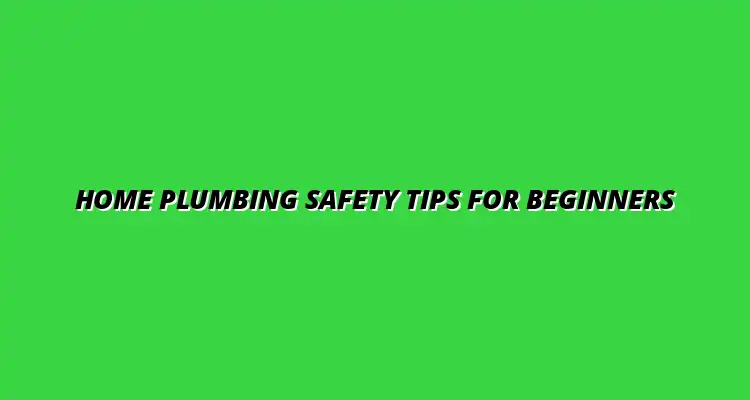
- Beginner Tips
- Feb 08
2025-01-03
Safety is a crucial aspect of any plumbing task, especially for beginners. When tackling plumbing projects, understanding and managing risks can help prevent accidents and injuries. It's essential to approach each task with caution and a clear plan to ensure a safe working environment.
In plumbing, various safety measures can significantly reduce the chances of mishaps. These include wearing the right protective gear, knowing how to handle tools properly, and being aware of potential hazards. By prioritizing safety, beginners can confidently engage in plumbing tasks without undue stress or fear. For more beginner-friendly tips, check out these DIY plumbing tips for homeowners.
For those new to plumbing, understanding the importance of safety cannot be overstated! It's not just about completing a task; it's about doing so without harming yourself or others. By focusing on risk management, beginners can navigate their projects more effectively and reduce their chances of facing dangerous situations.
Moreover, plumbing often involves working with water, which can create slippery surfaces and other dangers. Accidents can happen quickly, so it's vital to stay alert and take preventive measures. A well-informed beginner is less likely to encounter problems, making safety knowledge indispensable in the plumbing world. Learning to identify common plumbing problems safely is a crucial first step.
When working on plumbing projects, several hazards can pose risks to beginners. It's essential to be aware of these common dangers to effectively mitigate them. Here’s a list of typical plumbing hazards:
Being mindful of these hazards can help beginners stay safe and make informed decisions while working on plumbing projects. Awareness is the first step in preventing accidents!
Having the right tools and equipment is a key factor in ensuring safety when performing plumbing tasks. Not only do the proper tools make the job easier, but they also help prevent accidents and injuries. Investing in quality gear will pay off in the long run by enhancing your overall safety.
Another critical component of safe plumbing is the use of personal protective equipment (PPE). This gear creates a barrier between you and any potential hazards, ensuring that you can work confidently and securely. Let’s explore the essential safety gear every DIY plumber should have! For example, knowing how to fix a leaky faucet safely is a valuable skill.
Wearing the correct personal protective equipment is vital for any plumbing project. Here’s a list of must-have safety gear:
Each piece of safety gear serves a specific purpose, contributing to a safer working environment. By prioritizing protective equipment, you’re taking a significant step toward completing your plumbing projects without injury!
Using the right tools is essential not just for efficiency but also for enhancing safety while working on plumbing tasks. Here are some key aspects to consider when selecting the appropriate tools:
By carefully selecting the right tools, beginners can ensure they are well-equipped to handle their plumbing projects safely. Safety starts with the gear you use and the tools you choose! Regular maintenance is crucial; learn more about essential bathroom plumbing maintenance tips.
The most crucial safety tip for DIY plumbing projects is to always turn off the water supply before starting any work. This prevents unexpected leaks and flooding, which can lead to damage and accidents. Additionally, using the right personal protective equipment (PPE) is vital to ensure that you stay safe while working.
Here are some key safety practices to keep in mind:
Beginners can safely assess plumbing problems by following a few simple methods. Start by visually inspecting your plumbing fixtures and connections for any signs of leaks or damage. Look for water stains, corrosion, or mold, as these can indicate underlying issues. If you're experiencing kitchen plumbing problems, explore these kitchen plumbing problems and solutions.
Additionally, here are some techniques to help you identify problems without making things worse:
Regular maintenance of your plumbing tools and equipment is essential for ensuring safety during your projects. Inspect your tools frequently for any signs of wear or damage that could lead to accidents. Keeping your tools in good working condition helps prevent injuries and promotes efficient work. Efficient water heater maintenance is also key; here’s how to maintain your water heater efficiently.
Here are some maintenance tips:
Staying informed about plumbing safety practices is vital for homeowners and DIY enthusiasts. I encourage you to seek out additional training or resources to improve your plumbing knowledge. Many organizations and online platforms offer courses that cover various plumbing topics, including safety procedures. For example, check out our services in Tyseley, Birmingham.
Consider these options for further learning:
In summary, understanding plumbing safety is essential for anyone looking to tackle home projects. By taking necessary precautions and continuously educating yourself, you can significantly reduce the risk of accidents. Always remember that safety should be your top priority whenever you engage in plumbing work.
By following these guidelines, you’ll be well-equipped to handle your plumbing tasks safely and effectively. So, gear up, stay informed, and happy plumbing!
